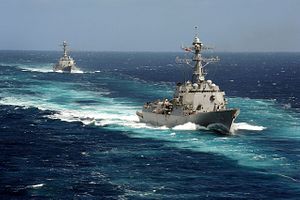Pentagon officials confirmed to The New York Times that the U.S. Navy has not conducted any Freedom of Navigation Operations (FONOPs) near disputed Chinese features in the South China Sea since President Donald Trump took office. In February and March the U.S. Navy and Pacific Command made at least three requests to conduct the operations, which challenge foreign maritime claims and rights beyond what the UN Convention on the Law of the Sea permits. But contrary to earlier rhetoric, the Trump administration appears to be following the Obama administration’s model of deferring FONOPs in favor of broader aspects of the Sino-U.S. relationship, like Chinese cooperation against the North Korean missile and nuclear programs.
The news confirmed earlier reports that Navy requests for new FONOPs in the South China Sea were stalled in Defense Secretary James Mattis’ office. The last FONOP against excessive Chinese claims was conducted last October at the end of the Obama administration. Timing suggests that the Navy’s most recent requests may have been deferred to avoid diplomatic complications in the run-up to Trump and President Xi Jinping’s April summit in Florida.
If so, it echoes reports that the Obama administration similarly deferred the U.S. Navy’s requests to conduct South China Sea FONOPs in early 2015 to ensure they did not mar a visit to Washington D.C. by Xi that March.
But rhetoric from the presidential campaign and early statements from administration officials had indicated that FONOPs would become more frequent and commonplace in the South China Sea during the Trump administration. During his February tour of Asia, Mattis reportedly assured his Japanese counterparts that the United States would be more active in asserting freedom of navigation in the South China Sea, and specifically that the U.S. would conduct FONOPs within 12 nautical miles of China’s man-made islands more frequently. The Navy’s early requests, and reports of expansive plans for new operations in the South China Sea, appeared to respond to that expectation.
However, in denying the Navy and Pacific Command’s requests for now, the Pentagon reportedly wants to balance those FONOPs with broader national security objectives. If the FONOPs were originally delayed out of concern for the success of April’s summit, they may now be taking a back seat to the administration’s focus on getting China to put pressure on North Korea after its recent spate of missile tests and in anticipation of a possible nuclear test.
Whether or not China’s cooperation on North Korea is reallycontingent on the absence or conduct of U.S FONOPs in the South China Sea, the Trump administration’s apparent concern about potentially broader political consequences of conducting them also echo earlier Obama administration concerns. Even after Obama and Xi met in March 2015, Secretary of State John Kerry apparently wanted to delay FONOPs until after negotiations of the Paris Climate Accords were finished in December. However, pressure from Senator John McCain and others in Congress appear to have motivated permission for the USS Lassen to conduct a FONOP around Subi reef in October.
Many experts think that FONOPs should be routinized and decoupled from other policy concerns. Ashley Tellis, a senior fellow at the Carnegie Endowment for International Peace, recently testified to the Senate Armed Services Committee that permission to conduct FONOPs should be delegated to the Pacific Command, instead of authorized from Washington. Notionally this would ensure that they were conducted regularly and without the fanfare or publicity that have accompanied them in the South China Sea.
The public attention around the South China Sea FONOPs is unique in the history of the modern Freedom of Navigation program, which began in 1983. Until recently, individual FONOPs were never publicized and instead summarized in annual reports that were careful not to specify the specific locations of the operations, the dates they were conducted, or by what vessels. That anonymity allowed the United States to assert its position on the Law of the Sea without creating public tension with the countries whose claims it conducted FONOPs against.
FONOPs’ low public profile ended in 2015 when McCain pressured defense officials to disclose that none had been conducted against Chinese-occupied islands in the South China Sea in the previous three years. Even though McCain and defense experts think that FONOPs should return to their earlier low profile, the publicity leveraged to restart them in the South China Sea during the Obama administration is unlikely to subside soon, especially amid reports that they are not currently being conducted by the Trump administration.
Admiral Harry Harris, head of the Pacific Command, told the House Armed Services Committee in April that he believed South China Sea FONOPs would be conducted again soon, and Patrick Murphy, the deputy assistant secretary of state for East Asian and Pacific Affairs, told reporters following last week’s ASEAN Foreign Minister’s Meeting that the United States would continue to conduct FONOPs in the South China Sea, but not when they would resume.
Still, the absence of FONOPs in the South China Sea since Trump was inaugurated does not mean that the United States has abandoned its interests there. Tellis disclosed in his testimony to the Senate that Trump communicated U.S. “red lines” over any renewed South China Sea activities to Xi at their summit in Florida. Kelly Magsamen, a former senior Pentagon and White House official for Asia and Pacific affairs, told the same Senate hearing that FONOPs “cannot be the measure of our strategy in the South China Sea,” a notion the U.S. Navy seems to agree with. Even if the Navy hasn’t conducted any FONOPS in the South China Sea against Chinese claims during the Trump administration so far, it has remained active there, conducting patrols, training exercises, and maintaining a surveillance presence.

































